
The 6 best URL shorteners of 2023
Share
Most URLs are long and unwieldy, which can make sharing them online—or even on a flyer or poster—pretty tricky. For years, the Google URL Shortener was a simple and free way to shorten them to something more manageable, but it was shut down back in 2019. The good news is, there are still plenty of alternatives out there.
With over a decade of experience reviewing tech and web apps, I can tell you there's almost never one perfect solution to any given problem. (The only exception to this is takeout: the best answer is always pizza.) The best URL shortening service depends on what you need and want it to do. There are simple, fast, and free URL shortening apps, marketing- and analytics-focused ones aimed at multinational enterprises, and everything in between.
To help you find the right URL shorteners for most people, I tested more than 35 different options. These are the best—and what makes them great.
Looking to shorten Google Drive or Google Docs links? Our tutorial shows you how to do this automatically, using Zapier.
The 6 best URL shortener services
Bitly for the best all-around URL shortener
Rebrandly for an alternative to Bitly
TinyURL for free, fast, and anonymous short URLs
BL.INK for business owners
URL Shortener by Zapier for automatically creating short links
Short.io for sending different visitors different links
What makes a great URL shortener?
How we evaluate and test apps
All of our best apps roundups are written by humans who've spent much of their careers using, testing, and writing about software. We spend dozens of hours researching and testing apps, using each app as it's intended to be used and evaluating it against the criteria we set for the category. We're never paid for placement in our articles from any app or for links to any site—we value the trust readers put in us to offer authentic evaluations of the categories and apps we review. For more details on our process, read the full rundown of how we select apps to feature on the Zapier blog.
At its most basic, a URL shortener takes some long, unwieldy link and turns it into a shorter link, one that's easy to share. For example, if you're making an ad for a roommate, you can take something like http://www.example.com/my-super-awesome-blog-about-squirrels/2022/10/23/live-with-a-squirrel-fan--they%27re-awesome, and turn it into https://tinyurl.com/live-with-me.
This shortened link means whoever sees your ad has an easy-to-type URL to visit, rather than having to type some long, unintelligible string of text where they're almost guaranteed to make a mistake. And it's not just for ads for roommates; URL shorteners allow you to provide a typable link on a business card, print ad, podcast interview, or any other situation where someone can't just click on a nice hyperlink.
While URL shorteners used to be useful for shortening longer links to fit character limits on social media and messaging apps, a lot of platforms take care of that for you. Twitter, for example, automatically shortens any shared links with its t.co shortening service (at least when it works), while iMessage obscures any links behind a preview card. If you're just sending things to your friends, you only really need to worry about URL shortening if you're exclusively using SMS.
In addition to that basic capability, here are the features I was looking for in a link shortener:
Analytics and click tracking. If you share a link to someone else's blog post with your audience, for example, you won't know much about how many people—and who—click through; all that data will be in the other person's analytics account. If you use a URL shortener, however, you'll have a unique short URL, so you'll also be able to see how many clicks the link gets, where they're coming from, and what devices people are using. Like with most marketing services, the more detailed and powerful these analytics, the higher the cost. Free services tend to have basic click tracking (although there's often a time limit and a limit on the number of total clicks tracked), while premium marketing options will collect as much data as possible—and even allow you to serve different URLs to people in different places or using different devices.
Customization of URLs. The best URL shorteners all allow you to customize your shortened URLs. This means you can make your URLs more relevant, or use different links in multiple ads or social media posts to compare click-through rates. Many basic or free plans for a short link generator only let you change the last part of the URL (so you get
https://tinyurl.com/awesome-squirrels), while the more business-focused services enable you to use a custom domain (so you getsquirre.ls/awesome).Standalone app. There are lots of different URL shortening options out there, and I limited my search to easy-to-set-up, standalone services. There are self-hosted versions, like Polr and YOURLS, that, while free and powerful, require too much technical knowledge to easily recommend. There are also URL shorteners built into other apps that I didn't consider. For example, Ow.ly is fully integrated into Hootsuite, and most newsletter services have some kind of URL shortening and tracking. I also didn't consider apps that give you a single updatable URL to get around a social media profile's limits on the number of links you can have in your bio, although many link shorteners are now starting to offer a similar feature.
Value for price. I paid particular attention to pricing tables and what each short URL generator offered at the different tiers. Some free plans are almost better than other apps' paid plans, at least if you don't want incredibly detailed analytics.
I've been testing apps for this list for the past three years. To update the list this year, I spent time with dozens of apps, shortening URLs and generally exploring how well they worked. URL shortening isn't a complex task, at least from a user interface perspective, so this was mostly to get a feel for how nice they were to use and what extra features and analytics they offered. Apps with more advanced features took more testing than simple free options. With that said, I wasn't looking for feature overload. Apps like Sniply that add a CTA over the links you share, while kind of compelling, felt too niche for most users.
In general, I relied on my experience using and testing software over the past decade to make any close judgment calls, as well as considering my notes on all the different apps from last year. If an app seemed under continuous development and was improving, it was much more likely to be considered favorably than one that looked to be stagnating.
With that, let's look at the best link shorteners.
Interested in doing even more with your URL shorteners? Check out our tips for how to use automation to track them, send them, and stay on top of performance.
Best all-around URL shortener
Bitly
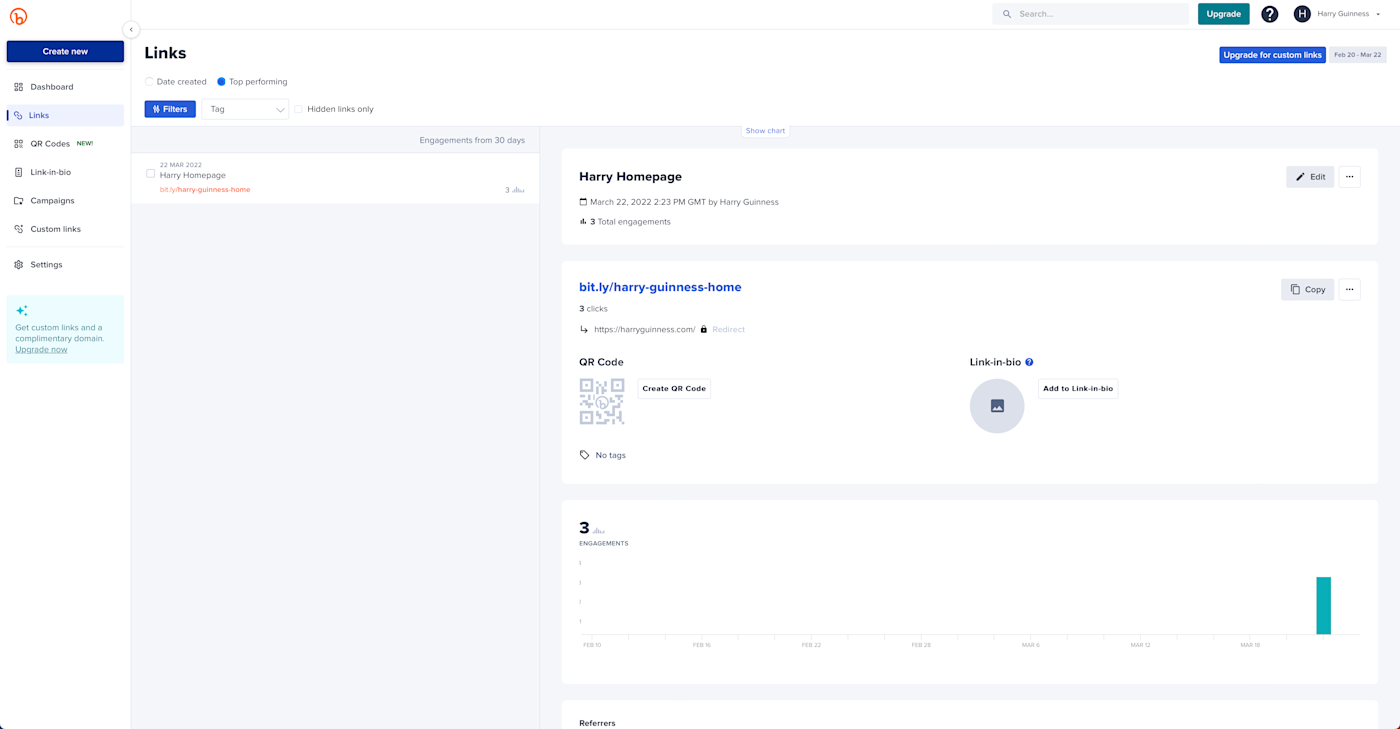
Bitly is a full-service, business-grade URL shortener. It's simple to use and has all the features you could ask for in a link management service. In addition to making it quick to create short links, it has a comprehensive dashboard where you can track how your social links and other campaigns are performing. You can also generate QR codes for all your short links, and it's even recently added a link-in-bio feature, so you really can manage all your links in one place.
While Bitly used to offer a good free account, the free plan isn't worth recommending anymore. You're limited to 10 links a month with only five custom URL back-halves (so, bit.ly/CUSTOM). My free account from a few years ago still gets 10,000 links/month, which is more than any of the regular paid plans.
The $35 per month Basic plan provides a free custom domain, allows you to create 1,500 links per month, and shows more data about who clicks your links. If you need more from Bitly, the Premium plan, at $300/month, is a big price step up but offers 3,000 links per month, more granular analytics for things including city-level data and device types, and other features. There's also a Starter plan with only 200 links per month, but you have to pay $192 upfront, which works out at $16 per month over the course of the year.
Bitly is a great URL shortener for large online businesses that share a lot of links and want to brand and track them. It's also a good choice for small businesses that want to generate short URLs and follow their stats for a modest number of campaigns. Really, Bitly has been doing this for so long that it is just an incredibly safe choice. If you're prepared to do a few calculations and dig deep into the pricing tables, you may well find a better deal with another app—but you're unlikely to be disappointed with Bitly, at least if you pay.
Bitly even integrates with Zapier, so you can do things like automatically generate short links from an RSS feed or add new links to a spreadsheet.
Bitly price: Free plan isn't really worth it; Basic plan from $35/month, with branded domains, more links per month, and support.
Best custom URL shortener for a Bitly alternative
Rebrandly
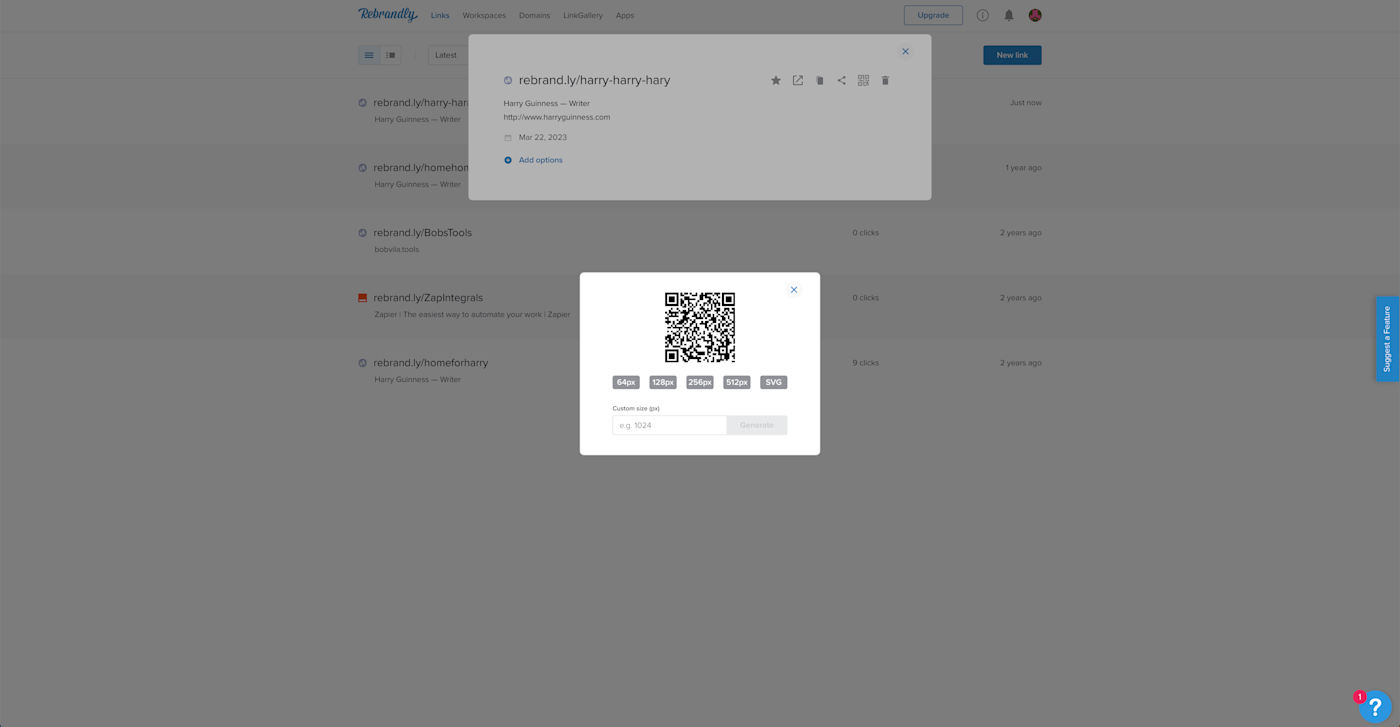
If you're looking for a powerful alternative to Bitly—or just one with a decent free plan—then Rebrandly is worth checking out. It's a great URL shortener like all the other apps on our list, and it offers a lot of value at different price points, so your needs can grow without you having to change services.
Let's talk about that free plan: you get 2,500 clicks tracked per month over 250 total branded links with a custom domain (though you have to buy it through Rebrandly) and all the same analytics as the entry-level paid plans. That should be more than enough for anyone operating a side hustle or running a small blog.
Upgrade to the $34 per month Essentials plan, $99 per month Professional plan, or $499 per month Teams plan, and you get more control over your links, the ability to use a domain name you already own, link targeting options, and on the Teams plan, up to 10 users.
On top of all that, Rebrandly is really nice to use. The web app is fast and minimalist, and it includes tools for tracking the popularity of each link, data about who's clicking on the links, and automatic QR code generation, too. Like Bitly, it's also got a link-in-bio feature called LinkGallery, and it integrates with Zapier, so you can do things like automatically create links from Google Sheets or add new links to Buffer.
Rebrandly price: Free plan with up to 250 links and 2,500 clicks tracked per month; Essentials plan from $34/month for 5,000 links and 25,000 clicks tracked per month.
Best free URL shortener for quick, anonymous use
TinyURL
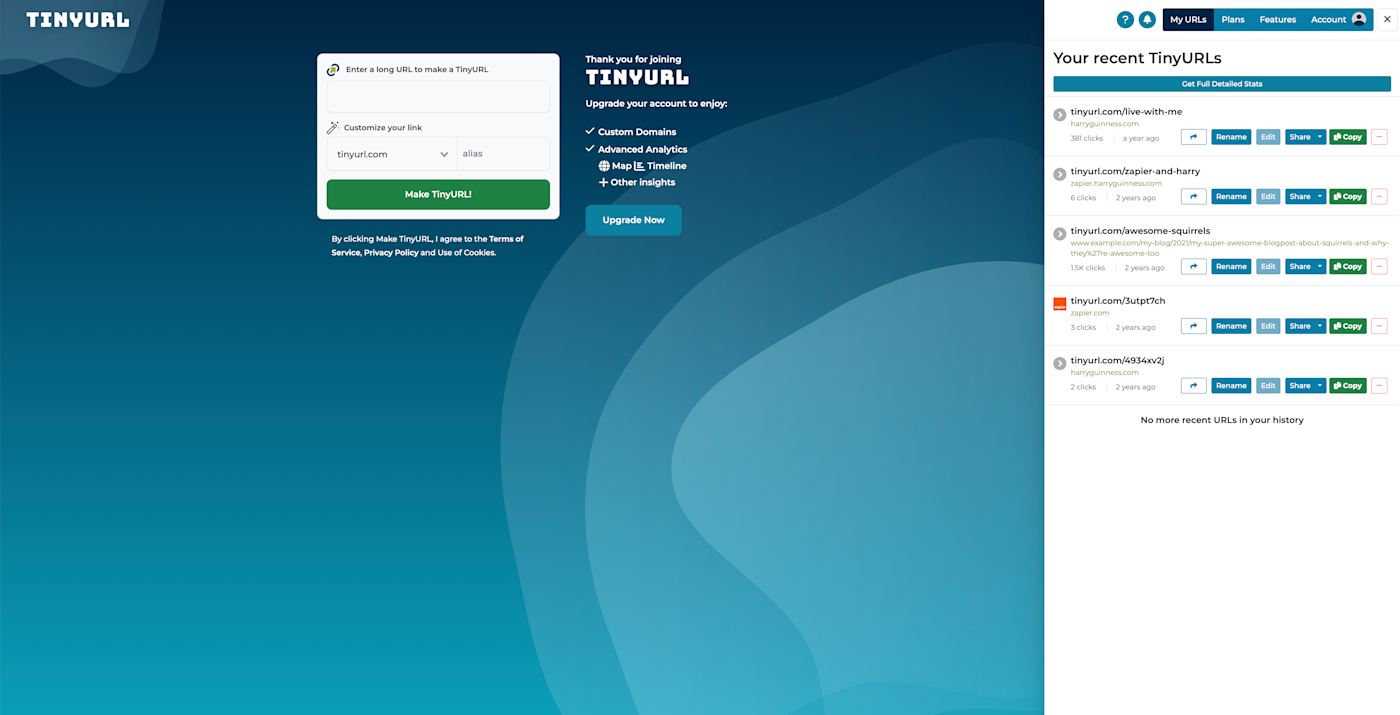
Free link shortener TinyURL has been in the game since 2002, and it's stuck around so long because it shortens URLs, and it does it with minimum fuss. It's a useful tool for when you're in a hurry and need to create a short link that will never expire. Just paste your long link into the box, customize the second half of the URL, if you want, and click Make TinyURL! You can then use that link indefinitely without fear that it will stop working.
Although you don't need an account to use TinyURL, if you sign up for one, you can see a history of all your shortened links. You can also subscribe to a paid plan if you want features like tracking and analytics, branded domains, and the ability to edit each TinyURL after you create it. Really, if your needs are simple, it's hard to go wrong.
TinyURL price: Free to use; Personal plan from $9.99/month (billed annually) for tracked links and branded domains.
Best URL shortener for business owners
BL.INK
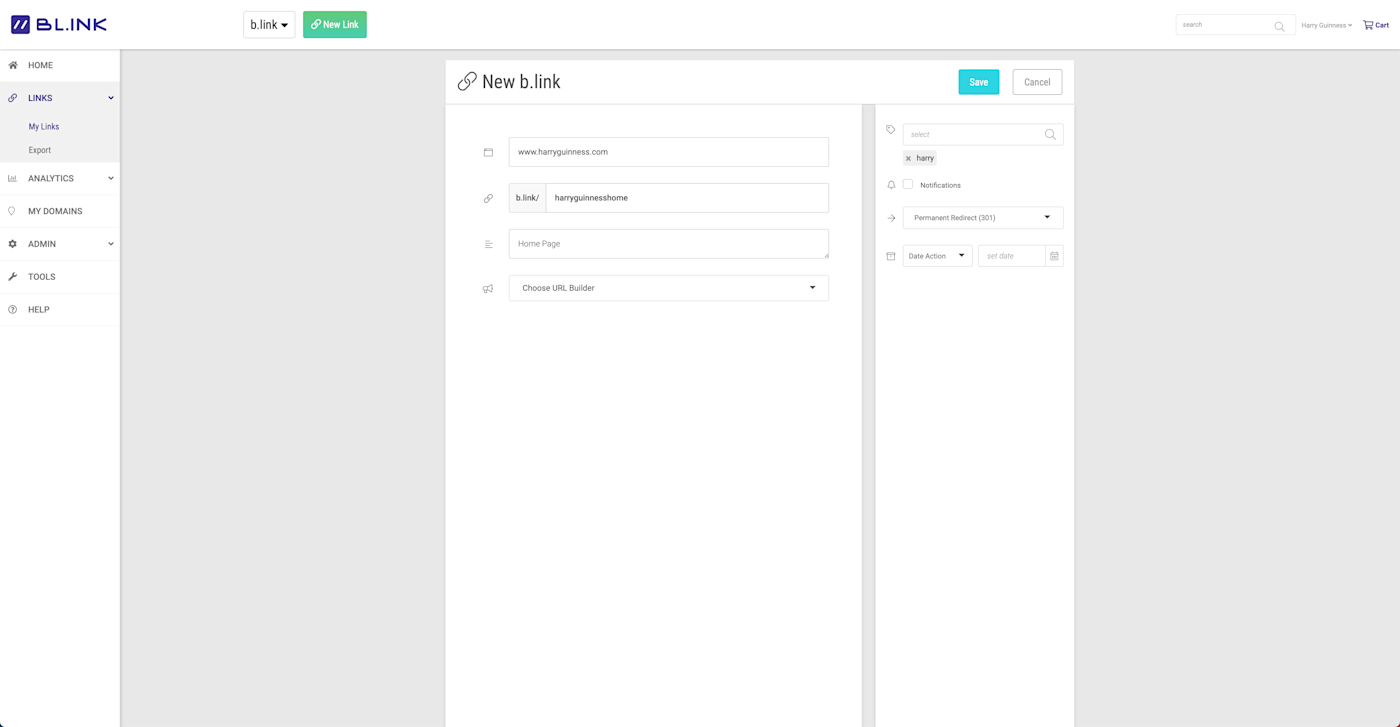
BL.INK is a full-featured small business and enterprise-focused URL shortener service that can be used to not only turn long URLs into short ones but also to track the traffic coming from your links. Its dashboard shows trending links and general statistics, while an analytics page lets you dive into traffic by device, location, and referrers. You can also drill down into clicks by the time of day. Tags, which you can add to your shortened links, let you view the link traffic related to specific campaigns.
BL.INK offers four tiers of paid plans starting from $48/month that give small businesses, teams, and larger enterprises a variety of options based on the number of links you need to generate and track. Free account holders can generate 1,000 active links, track up to 1,000 clicks per link, and create a custom domain to make branded links. Really, if you're a business in need of a full-service URL shortener that the entire team can access, then BL.INK is one of your best options. For less than 50 bucks a month, it offers features like multiple users, which cost hundreds of dollars a month with some other link shorteners.
Plus, BL.INK integrates with Zapier, so you can do things like automatically create short links from new WordPress posts or spreadsheet rows.
BL.INK price: Free plan with 1,000 active links and limited analytics; Expert+ plan from $48/month with 10,000 active links, 7,500 tracked clicks per link, and 3 users.
Best link shortener for automatically creating a short URL
URL Shortener by Zapier
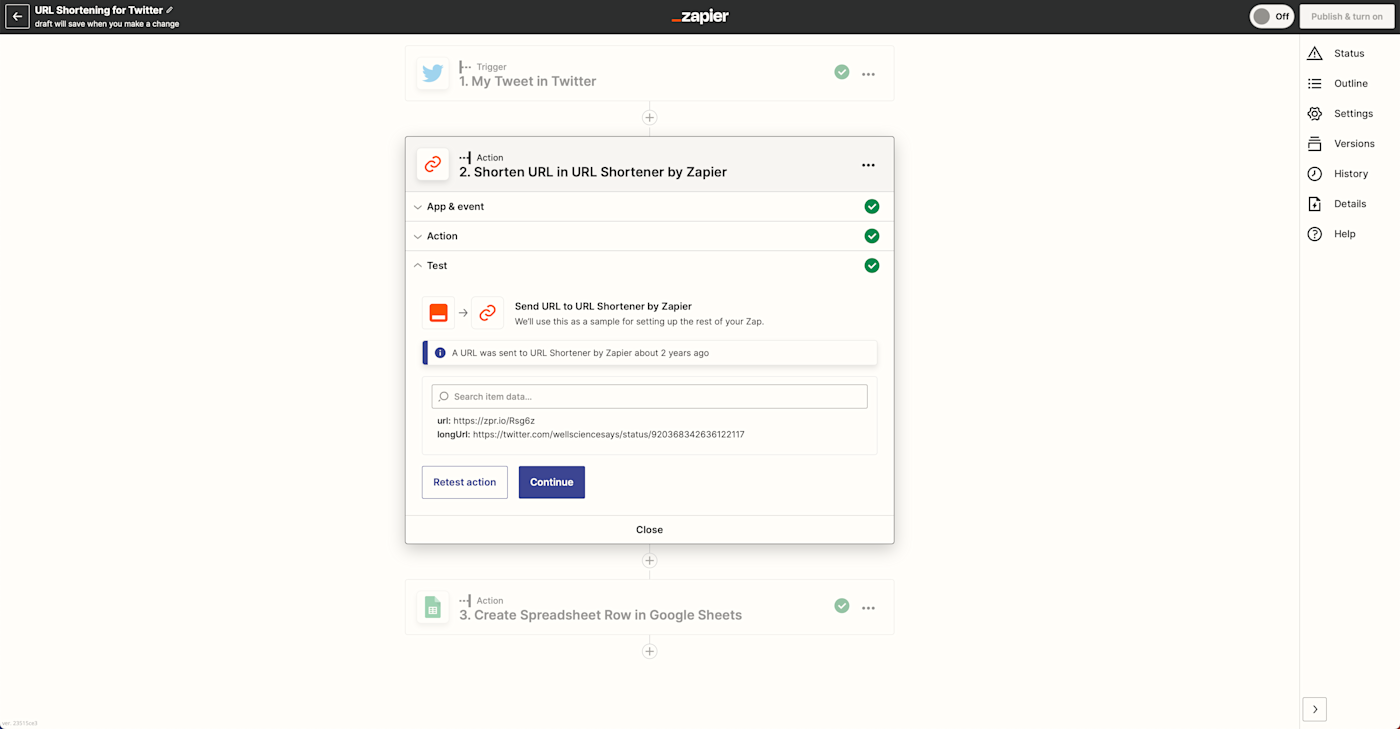
When you want to automatically create and save a shortened link every time you do something in any of more than 5,000 apps—like add a photo to your Instagram account or upload a new product to your Shopify store—Zapier's URL Shortener is the way to go.
You can create a Zap (an automated workflow on Zapier) that triggers every time you upload a post, create a product, or do something else in the other apps you use most. Zapier can then save the shortened URL to a Google Sheet or send it directly to another app.
This is the Zapier blog you're reading, so test it for yourself since we're a little biased, but if you're looking to add URL shortening to your automated workflows, this will do the trick. Here are some other popular ways people use Zapier's URL shortener.
URL Shortener by Zapier price: Free plan limited to 5 active single-step Zaps and 100 tasks/month; Starter from $29.99/month with 20 multi-step Zaps and 750 tasks/month.
Best URL shortener for sending different visitors different links
Short.io
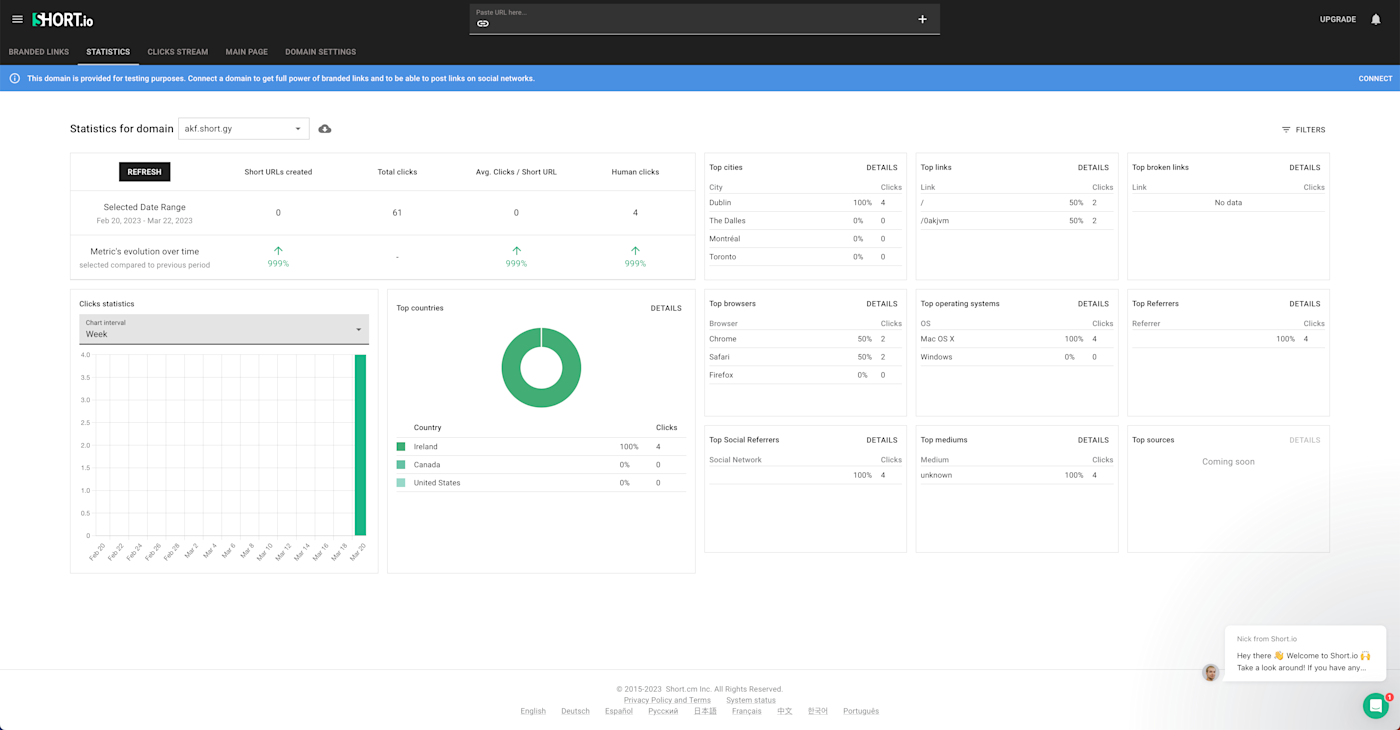
Most URL shorteners will happily tell you where people are clicking on your links and what devices they're using, but Short.io goes one better: it enables you to target visitors in different locations or using different devices and send them to a different link. This is useful if you want to make sure iOS users and Android users see the right app download link, or that your American, Canadian, Australian, and Singaporean customers all see the right kind of dollars.
When you add a link, click the Apple icon, Android icon, or the globe icon and select how you want to target your clickers and what link you want to serve them. You can, of course, send iOS users something totally different than desktop users, but that's probably going to be very confusing for everyone—including you. Instead, it's best to use this feature only when you have a reason to send different types of visitors to subtly different web pages.
Otherwise, Short.io is a great URL shortener, though unlike most options, you're required to use your own custom domain. Still, even on the free plan, you get five of them, which no other app on this list equals. You can set a default domain for any short link that doesn't work, and dig deep into when, where, and how people are clicking on your links in the Statistics and Clicks Stream sections.
And Short.io integrates with Zapier, so you can do things like create new short links from an RSS feed or Shopify products.
Short.io price: Free plan with 1,000 branded links, 50,000 tracked clicks, and device targeting; Personal plan from $19/month for unlimited branded links and geo-targeting.
Make your link short
As long as you make a shorter link, it doesn't really matter to your audience how you do it. So it comes down to how often you need to create a shortened URL and what kind of customization and analytics you need. Give each of these link shorteners a try, and then stick with the one that works best with the rest of your workflows—personally, my favorite is TinyURL.
Related reading:
This post was originally published in October 2018 by Jill Duffy. The most recent update was in March 2023.